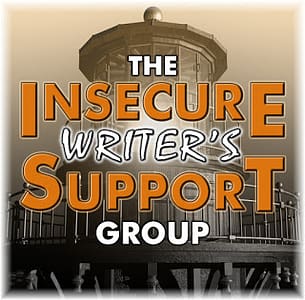
It’s the 1st Wednesday of the month again. That’s when I take part in Alex J. Cavanaugh’s Insecure Writer’s Support Group. I encourage you to check out their website and even sign up for the IWSG Newsletter. Today, for the first time, I won’t be answering the optional #IWSG question of the month (How has your creativity in life evolved since you began writing?). I just couldn’t come up with an answer. And, after all, it is “optional.” But I encourage you to check out some of the answers the other fabulous insecure writers have written. I will be writing about empathy.
One of the best things you can do to help your reader feel invested in your writing is to elicit feelings of empathy in them. How do you do this? And, what is empathy, anyway?
A recent surge of empathy
As our Minnesota summer began drawing to a close, our family filled as many open calendar squares as possible before the kids returned to school. Due to uncertainties about my husband’s health, we chose to stay home this summer rather than take our annual family road trip. I had some regrets about this. The summer felt a little less like it usually does. But, we ended the season well on Labor Day weekend. As we did, I felt a surge of empathy that sometimes strikes so powerfully that I am moved to tears.
We spent the Sunday before Labor Day in Stillwater, the oldest city in Minnesota. We gave each of our daughters a little spending money and they scoured the many antique stores for treasures. Then, we went on a riverboat cruise which included dinner and a Dixie jazz band. As we boarded, we saw that the tables near the windows were quickly filling up. There was one table with a woman sitting by herself. We asked if there was room for us and she kindly welcomed us to sit down.
Our fellow passenger
As we introduced ourselves, my husband asked her what prompted her to take the boat ride, all by herself. she told us that she was widowed this past year. She had come across a gift card for this riverboat company and decided to put it to good use. I hope she didn’t see the tears form in my eyes. They were partly selfish in nature as I sat face to face with my future.
Lately, this has been happening more and more. It’s not just people who have lost a spouse that move me to tears. Any loss seems to have this effect on me. That happens to me from time to time. Empathy takes over. This isn’t necessarily a bad thing. Empathy is one of the things that helps us to relate to others.
What is empathy?
Empathy is sympathy’s big brother. Sympathy is when you feel bad for someone who is going through a tough time. When you hear someone remark, “Aw, that’s terrible,” as they shake their head in pity, you are seeing sympathy. When you see someone cry because a famous person they don’t know has died, you are seeing empathy. Rather than just feeling bad for the person affected by the tragedy, they are affected by the tragedy. They feel the pain.
Why do some people feel more empathy than others?
People tend to feel more empathy when they can identify with the person. This is why fundraisers and marketers have learned that numbers do little to open someone’s heart and wallet. Rather than quote a statistic such as, “there were 790,000 new HIV infections in Africa in 2016,”[1] it would be better to tell the story of a single solitary boy in Africa who contracted HIV. Tell his story. Show his picture. Make us see him as a person, rather than a number. [2]
But, it’s more than just hearing someone weave a good story that evokes empathy in others. After all, it took a mere introductory sentence from our new friend on the riverboat to make me tear up. Scientists now believe that some people are genetically more empathetic, or sensitive to others. Dr. Aron, a Research Professor in Psychology at Stony Brook says there is physical evidence within the brain that highly sensitive individuals respond especially strongly to social situations that trigger emotions. Most of this “empathetic activity” occurs in the parts of the brain known as the “mirror neuron system”. These parts of the brain are responsible for processing sensory information, awareness, and empathetic response.[3]
When it becomes a problem
Usually, empathy is a good thing. It helps you care about others in a way that goes deeper than sympathy. But it can become a problem. Several years ago, I was in the habit of watching the evening news. Pretty soon I was crying every night because of one tragic event or another. It finally became too much when a tragic accident between a school bus and a minivan, which led to the deaths of all members of the family in the van. A few of the children on the bus sustained minor injuries. It was an accident that could have happened to anyone.
I spent hours crying about the family that died. It was so terrible. I could imagine them leaving home that day, just like every other day. The, around bedtime, I thought about the driver. I thought about what it would feel like to be responsible for the deaths of the family in the mini-van. How does someone get over that? Would the community ever forgive the bus driver? I cried even harder over that. I couldn’t sleep at night because of a nameless, faceless bus driver. It was all too much. I would have to stop watching the news.
Empathy and Anticipatory Grief
It may be that the surge of empathy I felt for our fellow river boat passenger was anticipatory grief. This is a phenomenon that often occurs in patients, caregivers, and family members during the course of a long illness such as Alzheimer’s, Multiple Sclerosis, ALS, and lengthy cancer, among others. This is grief with no definite endpoint because the ultimate loss (death) hasn’t happened yet. As you grieve in advance, a predicted death with an uncertain timetable, you prepare emotionally and practically in anticipation of that loss. This leaves one in a sort of limbo.
So, when instances arise which offer an opportunity to experience the hurt a bit, we do. It’s not that we want to, but rather, we almost need to, like a pressure cooker’s steam valve. We spend so much time trying to keep our emotions in check that we don’t feel them until someone else comes along who has felt the pain, too.
Empathy can help the Empathizer
This is a positive outcome of empathy. While identifying with someone else’s pain, you realize that you are not alone in your experience. If it were under other circumstances, I would like to have talked more personally with our fellow boat passenger. I didn’t want to put a damper on the festive atmosphere, though. It was enough to talk about the other things we had in common.
Empathy in your writing
As a writer, it is important to make your protagonist feel empathy. This is because your reader will most likely identify with the protagonist and in turn feel empathy, as well. This helps your reader invest, emotionally in the story you have written. The reporter who wrote the news story about the school bus crash did this very effectively with me. She had me up crying all night long over strangers. THAT’S good writing. Granted, I probably have a stronger sense of empathy, in general, but it’s important, as a writer, to know how to initiate that in your readers.
What are YOUR thoughts?
I’d love to hear in the comment section, below. I appreciate my readers as well as the writing community. To show that appreciation, I use Comment Luv. Just leave a comment below and your latest post will get a link next to it. Thank you!
About Heather Erickson
I am an author, writer, and speaker and homeschooling mom of 3. Since doctors diagnosed my husband, Dan with stage IV lung cancer in 2012, I’ve focused my writing and speaking on helping cancer patients and their families advocate for themselves and live life to the fullest, in spite of their illness. My goal is to help people face cancer with grace. My books are available at Amazon.com:
Facing Cancer as a Friend: How to Support Someone Who Has Cancer
Facing Cancer as a Parent: Helping Your Children Cope with Your Cancer
I also blog about living with cancer at Facing Cancer with Grace.
Footnotes
[1] Chutel, Lynsey. “Nine out of Ten Adolescent Deaths Due to AIDS Are in Africa.” Quartz, Quartz, 1 Dec. 2017, qz.com/africa/1144158/hiv-aids-statistics-in-africa-nine-out-of-ten-adolescent-deaths-due-to-virus/.
[2] Moreau, Patrick. “The Importance of Storytelling over Statistics. A Powerful Research Study.” Muse Storytelling, www.musestorytelling.com/blog/importance-of-storytelling.
[3] Russon, Mary-Ann. “Why Some People Are Genetically More Sensitive or Empathetic than Others.” International Business Times UK, Blizzard Entertainment, 24 June 2014, www.ibtimes.co.uk/why-some-people-are-genetically-more-sensitive-empathetic-others-1454042.


12 comments on “Empathy : Emotions in Writing #IWSG”
Mandy
November 7, 2018 at 8:22 amLuckily or unluckily I’m not very empathetic. I very rarely can feel another’s pain. I can see how convincing your reader to be empathetic can influence how much of what you’ve written that they read. If the reader doesn’t have a connection, why continue? Wonderful post! Thank you for sharing your story. 🙂
heatherericksonauthor
November 8, 2018 at 4:52 pmThank you, Mandy. I have a daughter who really struggles to understand other people’s feelings. She feels bad when she sees something sad, but she can’t figure out what someone is feeling as she is interacting with them. It has caused her some problems in relationships. She’s still a great writer, though. Empathy is particularly good in fiction and journalism. I checked out your blog today and really loved the layout. Have a great time in Egypt!
Jacqui Murray
November 7, 2018 at 10:37 amGreat article, Heather. I have never suffered from too much empathy. I would like to be more compassionate but it’s always a battle. Often, I start with “What would others do” and try to step forward with that. This was quite interesting to read.
heatherericksonauthor
November 8, 2018 at 4:56 pmHi Jacqui. It’s interesting how many people have responded that they don’t feel a lot of empathy. Perhaps writing about other people’s lives is our way of experiencing their feelings. We know what they are because we create these characters, but their feelings aren’t necessarily our own. Once, I wrote a story with a widow as the main character. I cried through an entire scene. It was my way of processing what my life will one day look like when I lose my husband, much like meeting the woman on the boat. I like your technique of “what would others do.” I will have to try that.
elizabeth seckman
November 7, 2018 at 2:01 pmHugs. Lots of them. Cancer sucks and I feel that punch in the gut you’re talking about. I think empathy helps me through the hardest times. Whenever I feel sorry for myself, I run into someone who is in a darker place and I’m reminded that we all have our struggles and to get through, we need to take turns getting and giving the support.
Years ago, I was in a somewhat similar situation. My family went to a play and the lady next to us was recently widowed. She told us that she was just then getting out and about after the death of her husband. That took courage. Hopefully, we were good enough company to make the evening enjoyable.
I’d recently lost my brother and I’d been feeling sorry for myself. I was overlooking the obvious blessings in my life by feeling sorry for myself. Empathy can give us that perspective so we can appreciate what we have.
heatherericksonauthor
November 8, 2018 at 5:05 pmHi Elizabeth. I love what you said about Empathy giving us the perspective to appreciate what we have. That’s so true. I think these meetings are like divine appointments allowing us to have an instant therapy session of sorts. They give us a glimpse into the pain of another, helping ours to heal just a bit more. Thank you for your kind response. Have a wonderful week!
Fundy Blue (Louise)
November 7, 2018 at 10:34 pmWow! What an excellent post on empathy, Heather. I’m sorry that you are going through such a difficult time. Cancer has taken members of my extended family. It is a cruel disease. It sounds like your family had a memorable Labor Day weekend. It doesn’t matter where you are or what you do as long as you make the most of the time you are given with the people you love. Take care!
heatherericksonauthor
November 8, 2018 at 5:18 pmThank you, Louise. I’m sorry for the losses you’ve experienced to cancer. It’s a vile thing. I wasn’t prepared for it, but somehow we catch up to speed pretty quick when we are called into its trenches. I’m so thankful for the many things we have learned on this journey. As bitter as it can be, we want it to last a long time. I guess we are a gluten for punishment. I love my husband so much. I’m grateful for the years we’ve been granted. Have a great week!
Liz A.
November 8, 2018 at 12:50 pmSounds like it was a nice riverboat ride otherwise.
Those with lots of empathy can be considered “too sensitive”. I suffer from that. Don’t show me your boo-boo for I’ll feel sympathetic pain from it. I can’t see or read stories about the Holocaust as they’ll make me sick. Certain procedurals on TV I can’t watch because I feel the crime.
So, yeah, I understand. Not watching the news is a good first step.
heatherericksonauthor
November 8, 2018 at 5:27 pmHi Liz. We need tender people in this world. It balances out the cynicism. We do need to be careful about the news, though. 😉
Ellen @ The Cynical Sailor
November 10, 2018 at 4:52 amWhat a fabulous blog post! So much I didn’t realize about empathy and highly sensitive people. The comments are great as well. I think it’s wonderful that you sat with that woman who was all by herself and shared the riverboat cruise with her.
heatherericksonauthor
November 14, 2018 at 10:03 amThank you, Ellen. She was so wonderful to talk to. Both she and her husband were writers–and good ones, at that! We later exchanged books in the mail. It really felt like a divine encounter. Her voyage was more than a pleasure cruise. She was actually doing research for a book. So, my hope is that we didn’t take too much of her time. Have a wonderful week!